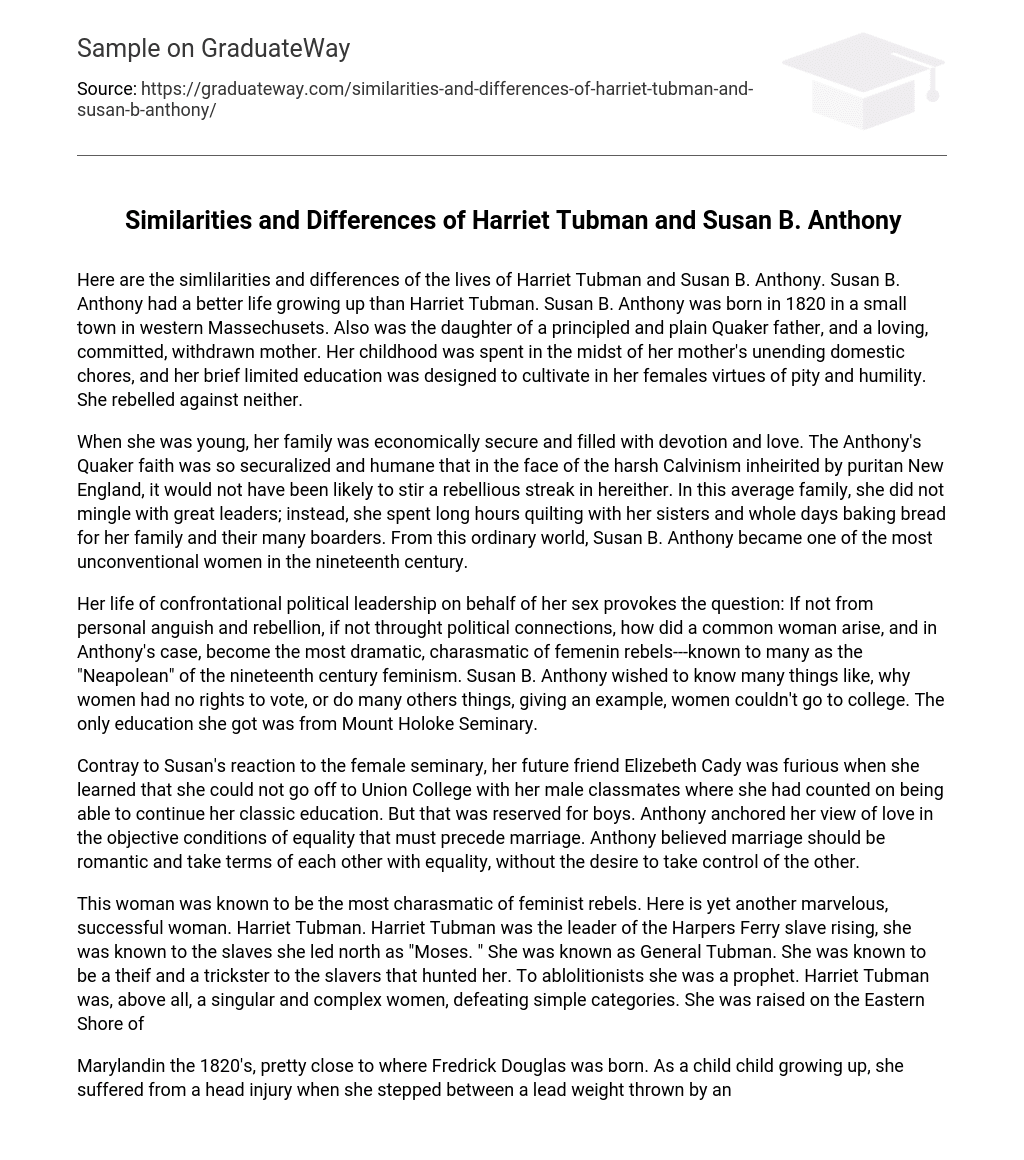Here are the simlilarities and differences of the lives of Harriet Tubman and Susan B. Anthony. Susan B. Anthony had a better life growing up than Harriet Tubman. Susan B. Anthony was born in 1820 in a small town in western Massechusets. Also was the daughter of a principled and plain Quaker father, and a loving, committed, withdrawn mother. Her childhood was spent in the midst of her mother’s unending domestic chores, and her brief limited education was designed to cultivate in her females virtues of pity and humility. She rebelled against neither.
When she was young, her family was economically secure and filled with devotion and love. The Anthony’s Quaker faith was so securalized and humane that in the face of the harsh Calvinism inheirited by puritan New England, it would not have been likely to stir a rebellious streak in hereither. In this average family, she did not mingle with great leaders; instead, she spent long hours quilting with her sisters and whole days baking bread for her family and their many boarders. From this ordinary world, Susan B. Anthony became one of the most unconventional women in the nineteenth century.
Her life of confrontational political leadership on behalf of her sex provokes the question: If not from personal anguish and rebellion, if not throught political connections, how did a common woman arise, and in Anthony’s case, become the most dramatic, charasmatic of femenin rebels—known to many as the “Neapolean” of the nineteenth century feminism. Susan B. Anthony wished to know many things like, why women had no rights to vote, or do many others things, giving an example, women couldn’t go to college. The only education she got was from Mount Holoke Seminary.
Contray to Susan’s reaction to the female seminary, her future friend Elizebeth Cady was furious when she learned that she could not go off to Union College with her male classmates where she had counted on being able to continue her classic education. But that was reserved for boys. Anthony anchored her view of love in the objective conditions of equality that must precede marriage. Anthony believed marriage should be romantic and take terms of each other with equality, without the desire to take control of the other.
This woman was known to be the most charasmatic of feminist rebels. Here is yet another marvelous, successful woman. Harriet Tubman. Harriet Tubman was the leader of the Harpers Ferry slave rising, she was known to the slaves she led north as “Moses. ” She was known as General Tubman. She was known to be a theif and a trickster to the slavers that hunted her. To ablolitionists she was a prophet. Harriet Tubman was, above all, a singular and complex women, defeating simple categories. She was raised on the Eastern Shore of
Marylandin the 1820’s, pretty close to where Fredrick Douglas was born. As a child child growing up, she suffered from a head injury when she stepped between a lead weight thrown by an irrate master and was meant for the slave. For the rest of her life she suffered from visions and delibitating episodes. Still in her early twenties she left her family and husband, a free black, to make the journey north alone. Within the year of being in Philidelphia, she was drawn back to the south, to save family members from being sold in an auction, then thers. Soon she became one of the most infamous enemy of slaveholders. She established herself as the first black woman of few black men to conduct the Underground Railroad. Tubman made over a dozen trips in south in raids that were so brazen and successful, a bounty was placed on her head, this was all leading up to the Civil War. When the Civil War broke out, she was the only woman to officially lead men into battle, while serving the Union Army, she acted like a scout and a spy in South Carolina.
Harriet Tubman was one of the most important and enduring figures in American history. She believed that sensing danger was her second sight. No matter what, she could never leave work unfinished. Susan B. Anthony and Harriet Tubman were very different in lifestyle and were similar because of how important they were to our society. These two women were the most inspiring, notable women that the United States ever really had. One helped free women from having no rights, and the other helped free blacks from slavery.





